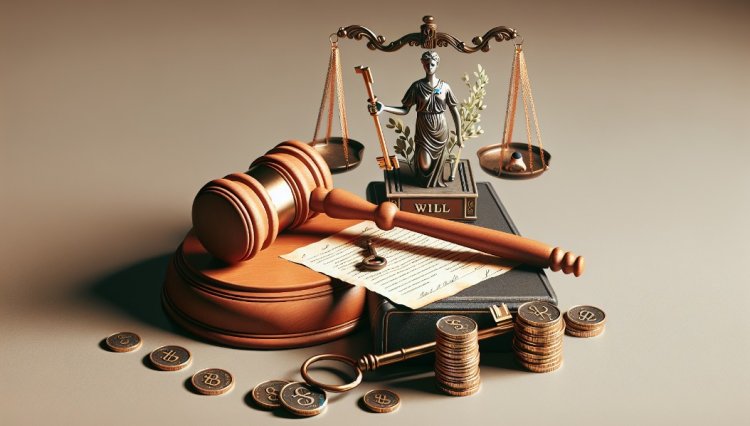What Happens to Money in a Bank Account When the Account Owner Passes Away?
Unravel the mystery with this comprehensive guide. Explore inheritance options, and legal procedures, and ensure your loved ones are financially secure.

The Role of Executives and Administrators
When someone dies, their money and belongings are taken care of so that nothing is left unattended. The job of handling their money is given to certain people called executives or administrators. When someone passes away, they often leave behind a document called a will. This will contain their wishes for what should happen to their belongings and money after they're gone. The people in charge of making sure these wishes are followed are called executives. They have the important job of carrying out the instructions in the will. This means taking care of any money owed and dividing up whatever money the person who passed away had in the bank.
If someone passes away without leaving instructions on how to distribute their belongings, or if the people they chose to handle these matters are unable or don't want to do it, then a judge will choose someone to take care of these things. This person is called an administrator, and they will be responsible for managing and distributing the person's belongings. Administrators are like executives, but instead of carrying out instructions from a will, they have to distribute the belongings of someone who has passed away based on the laws of the state. Both executives and administrators have a legal duty to make decisions that are in the best interests of the estate. If they don't fulfill this duty, they can be held legally accountable.
So, when someone passes away, what happens to the money they had in the bank? It doesn't just sit in one place, collecting dirt. When someone passes away, the money they have is used to pay off any debts they have. After that, whatever money is left is given to the people who were named in the person's will or according to the laws of the state. When someone passes away, their money in the bank doesn't stay with the bank. Instead, the bank keeps it safe until the people in charge, like the bank executives or administrators, give it to the right people. This is done to make sure that the wishes of the person who passed away or the laws of the state are followed, even after they are no longer here.
The Process of Probate
Before any distribution of assets happens, there is a legal process called probate. This process ensures that a deceased person's belongings and property are properly handled and distributed according to their wishes. Probation is a legal process that happens when someone passes away. It's the way to figure out what happens to their belongings and money. It is supervised by a special court called a probate court and includes several important actions that need to be taken.
The first thing we need to do is make sure that we have the right document that shows what the person who passed away wanted to happen with their belongings. This document is called a will, and it tells us who should receive what. The court has officially declared that the will is real and correctly shows what the person who passed away wanted to happen with their belongings. If someone passes away without leaving a will, the court will decide who receives the person's belongings and property by following the rules set by the state.
Afterward, the court determines the things that the person who passed away owned, such as any money they had in their bank accounts. This could mean looking very closely at the deceased person's financial documents or even searching through their belongings in person. These items are evaluated to find out how much they are worth right now.
When someone passes away, the court takes the things they own, like money or property, to pay any money they still owe to others, like debts or taxes. This could include the money you owe for using a credit card, the money you owe for buying a house, or the money you owe to the government based on how much money you earned. If someone has money in their bank account, they can use it to help pay off the money they owe.
After the person who passed away has paid off all the money they owed and the taxes they owed to the government, whatever is left of their belongings and money is given to the people they chose to receive them in their will. If the person who passed away had money in a bank account and didn't use it to pay off debts, that money would be given out to the people who were receiving the person's belongings.
During this entire process, the bank doesn't take much action. The money in the deceased person's account doesn't get decided right away. Instead, it waits for instructions from the people in charge of the person's belongings or the special court that handles these matters. The bank's main responsibility is to protect people's money and make sure it is kept secure until it needs to be given out.
Dormant and Unclaimed Accounts
What happens if someone passes away without leaving a legal document that says who should receive their belongings, if there are no known family members, or if the money they had is accidentally overlooked and not given to anyone? This brings us to the topic of accounts that are not being used or claimed.
Imagine if someone named Terry Williams were to pass away without any known family members and without leaving behind any legal document stating how their belongings should be distributed. When someone has an account at the bank but doesn't use it for a long time, it becomes a dormant account. Banks have a system in place to handle these types of accounts. According to the law, they have to try their best to find the rightful owners. They use traditional mail, make calls on the telephone, and sometimes even hire people to help find the people who are supposed to receive something but are not known yet.
If we can't find the people who own the account, it just sits there, and the money doesn't get claimed. Contrary to what many people think, the bank doesn't simply keep the money for themselves. After a certain amount of time, which can be different depending on the state but is usually about 5 years, the money is given to the government. This means that the money is given to the government.
If someone forgets about their money, the government steps in and takes care of it until they find the person it belongs to. In lots of places, you can use the internet to look up if there's any money that belongs to you but you haven't claimed it yet. You could find money that you saved a long time ago or a paycheck that you forgot to cash from a job you had during the summer. It's a good idea to take a look because you might discover something nice that you weren't expecting.
So, when someone passes away, the money in their bank account goes through a process called inheritance. This means that the money is given to the person's family or loved ones according to their wishes, as stated in a legal document called a will. If there is no will, the government establishes a set of guidelines for how to distribute the funds. It goes through a very organized and supervised process. Executives or administrators are given the important task of taking care of the money and making sure it is used wisely. The probate process is a way to make sure that when someone passes away, their money and belongings go to the right people. It adheres to the guidelines that the person who left them behind or the laws set forth by the government.
Share your thoughts.
What do you think about this way of doing things? Do you believe it is just and reasonable? Please leave your thoughts and opinions in the comments section.



 admin
admin 










